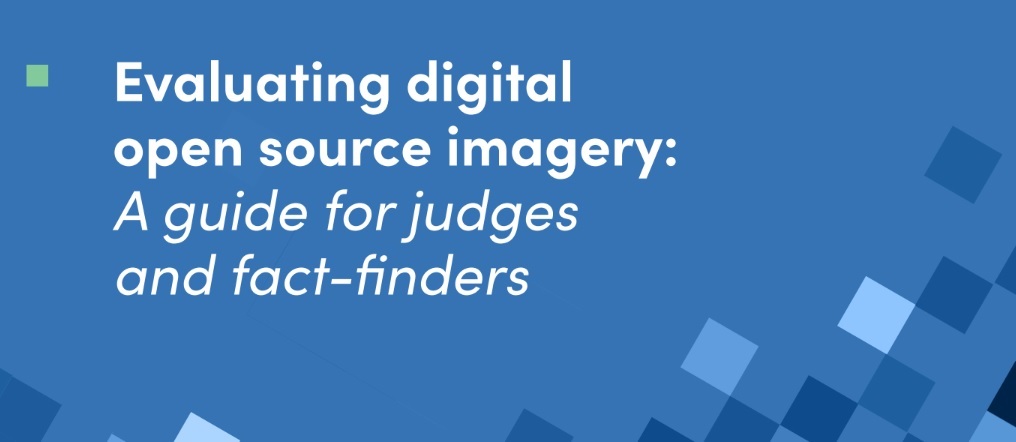Pioneering Guide Helps Judges to Navigate Digital Open Source Evidence
‘Evaluating Digital Open Source Imagery: A Guide for Judges and Fact-Finders,’ a groundbreaking resource authored by leading experts, is aimed at equipping judges and fact-finders with essential tools to effectively evaluate digital open source evidence in legal proceedings.
In today’s digital age, the influx of open-source information has become increasingly vital in the pursuit of accountability and justice, particularly in the realms of human rights, humanitarian law, and international criminal law. Recognising the critical role that digital open source imagery plays in legal proceedings and fact-finding missions, a collective of legal scholars, human rights advocates, and experts in open source investigations have come together to produce a groundbreaking resource: ‘Evaluating Digital Open Source Imagery: A Guide for Judges and Fact-Finders.’
The guide is the result of a collaboration between WITNESS and leading institutions including Queen Mary University of London, Open Society Justice Initiative, University of California Berkeley, Mnemonic, Swansea University, University of Essex, University of Oxford, and the Hertie School Centre for Fundamental Rights. This pioneering guide seeks to demystify the complex process of evaluating digital open-source imagery. At its core, the guide aims to equip judges, fact-finders, and decision-makers with the necessary tools to assess the credibility, reliability, and probative value of open source evidence effectively.
Speaking on the launch of the guide, Associate Director at WITNESS, Raquel Vazquez Llorente, said: “As generative AI and digital manipulation techniques become increasingly sophisticated, digital evidence emerges as both a powerful investigative tool and a potential pitfall. We designed our guide to equip judges and fact-finders with the essential knowledge needed to expertly discern the authenticity of digital evidence and uphold the integrity of modern legal processes.” Earlier this year, Raquel published an article in the SciTech Lawyer Magazine of the American Bar Association, delving deeper into the impact of deepfakes and synthetic media in international justice.
Designed as a comprehensive resource, the guide covers a range of key issues relevant to the evaluation of digital open-source information, including authenticity verification, metadata analysis, and source validation. By providing clear definitions, practical examples, and insightful guidance, the guide enables users to make informed assessments and decisions when confronted with open-source evidence.
“Digital open-source information has emerged as a powerful tool in the pursuit of accountability,” says Dr. Daragh Murray, Queen Mary University. “However, its utilisation presents unique challenges for legal professionals. This guide represents a milestone in addressing these challenges and empowering judges and fact-finders to navigate the complexities of open source evidence.” Hadi Al Khatib, Mnemonic says: “We hope that this guide will assist judicial bodies in understanding and evaluating digital open source evidence, crucial for advancing accountability and justice in our digital age.”
“This guide fills a crucial gap in the legal landscape,” notes Prof. Yvonne McDermott Rees, Swansea University. “For the first time, judges and fact-finders have access to a dedicated resource that equips them with the knowledge and tools necessary to evaluate digital open source information effectively.”
Prof. Başak Cali, Professor of International Law at the Hertie School and University of Oxford says, “This Guide, by making the complex and technical terrain of open-source evidence more accessible for judges and fact finders, will bring us closer to ensuring accountability for human rights violations around the world.”
Released on Monday 20 May 2024, ‘Evaluating Digital Open-Source Imagery: A Guide for Judges and Fact-Finders’ represents a pivotal advancement in the field of legal practice and human rights advocacy. Its availability in multiple languages, including English, Ukrainian, Arabic, French, and Spanish, ensures accessibility to a global audience.
The guide is accessible online at https://www.trueproject.co.uk/osguide, with a launch event scheduled for Friday 24 May 2024, 3:30-5pm at Inner Temple, Crown Office Row, Temple, London EC4Y 7HL (RSVP here).
Further events surrounding the guide will be held globally. If you would like to find out more about these events, or wish to attend or host an event, please contact: jacobo@witness.org. For media interviews or more information on this release, contact Fatima Anwar: fatima@witness.org

